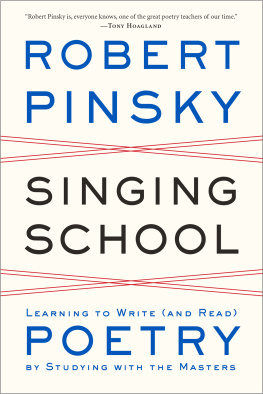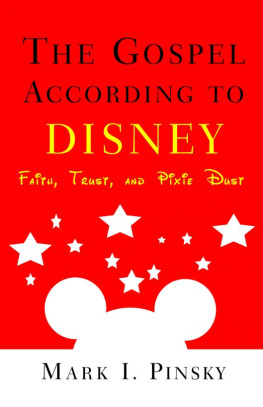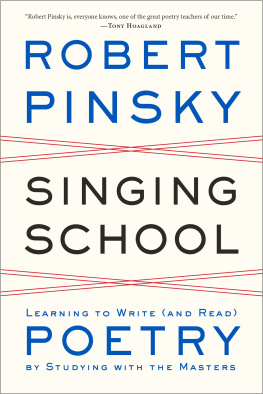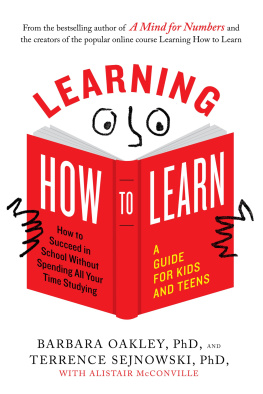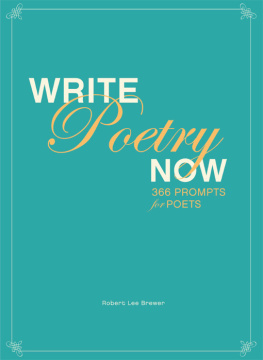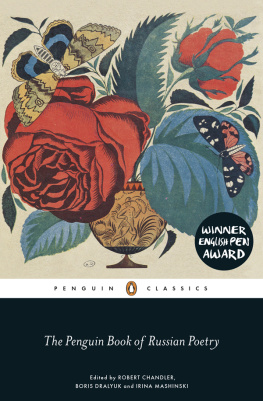Robert Pinsky - Singing School: Learning to Write (And Read) Poetry by Studying With the Masters
Here you can read online Robert Pinsky - Singing School: Learning to Write (And Read) Poetry by Studying With the Masters full text of the book (entire story) in english for free. Download pdf and epub, get meaning, cover and reviews about this ebook. year: 2013, publisher: W. W. Norton & Company, genre: Romance novel. Description of the work, (preface) as well as reviews are available. Best literature library LitArk.com created for fans of good reading and offers a wide selection of genres:
Romance novel
Science fiction
Adventure
Detective
Science
History
Home and family
Prose
Art
Politics
Computer
Non-fiction
Religion
Business
Children
Humor
Choose a favorite category and find really read worthwhile books. Enjoy immersion in the world of imagination, feel the emotions of the characters or learn something new for yourself, make an fascinating discovery.
- Book:Singing School: Learning to Write (And Read) Poetry by Studying With the Masters
- Author:
- Publisher:W. W. Norton & Company
- Genre:
- Year:2013
- Rating:3 / 5
- Favourites:Add to favourites
- Your mark:
- 60
- 1
- 2
- 3
- 4
- 5
Singing School: Learning to Write (And Read) Poetry by Studying With the Masters: summary, description and annotation
We offer to read an annotation, description, summary or preface (depends on what the author of the book "Singing School: Learning to Write (And Read) Poetry by Studying With the Masters" wrote himself). If you haven't found the necessary information about the book — write in the comments, we will try to find it.
Singing School: Learning to Write (And Read) Poetry by Studying With the Masters — read online for free the complete book (whole text) full work
Below is the text of the book, divided by pages. System saving the place of the last page read, allows you to conveniently read the book "Singing School: Learning to Write (And Read) Poetry by Studying With the Masters" online for free, without having to search again every time where you left off. Put a bookmark, and you can go to the page where you finished reading at any time.
Font size:
Interval:
Bookmark:
 ALSO BY ROBERT PINSKY Poetry Selected Poems Gulf Music Jersey Rain The Figured Wheel The Want Bone History of My Heart An Explanation of America Sadness and Happiness The Inferno of Dante (translation) Prose Thousands of Broadways The Life of David Democracy, Culture, and the Voice of Poetry The Sounds of Poetry Poetry and the World The Situation of Poetry Landors Poetry Edited by Robert Pinsky Essential Pleasures An Invitation to Poetry Poems to Read Americans Favorite Poems The Handbook of Heartbreak
ALSO BY ROBERT PINSKY Poetry Selected Poems Gulf Music Jersey Rain The Figured Wheel The Want Bone History of My Heart An Explanation of America Sadness and Happiness The Inferno of Dante (translation) Prose Thousands of Broadways The Life of David Democracy, Culture, and the Voice of Poetry The Sounds of Poetry Poetry and the World The Situation of Poetry Landors Poetry Edited by Robert Pinsky Essential Pleasures An Invitation to Poetry Poems to Read Americans Favorite Poems The Handbook of Heartbreak  CONTENTS I HAVE HEARD ALLEN Ginsberg recite John Miltons Lycidas from memory. Ginsberg possibly could thank his poet father, or his teachers at Columbia University, for calling Lycidas to his attention, but he absorbed and recalled its music for his own purposes, by his own judgment. Ginsbergs notebooks, with their self-set exercises in iambic pentameter, demonstrate the process. (With a serious students requisite combination of compliance and resistance, the apprentice Ginsberg forms a correct pentameter line on his own subject: Let cockcrow crown the buttocks of my Pete.) That the poem by Milton (16081674) had gotten under the skin of Ginsberg (19261997) exemplifies the ideas that govern this book: examples precede analysis; young poets can learn a lot from old poetry. Models provide inspiration, which is different from imitation. The visual artist looks at the world, but also at art.
CONTENTS I HAVE HEARD ALLEN Ginsberg recite John Miltons Lycidas from memory. Ginsberg possibly could thank his poet father, or his teachers at Columbia University, for calling Lycidas to his attention, but he absorbed and recalled its music for his own purposes, by his own judgment. Ginsbergs notebooks, with their self-set exercises in iambic pentameter, demonstrate the process. (With a serious students requisite combination of compliance and resistance, the apprentice Ginsberg forms a correct pentameter line on his own subject: Let cockcrow crown the buttocks of my Pete.) That the poem by Milton (16081674) had gotten under the skin of Ginsberg (19261997) exemplifies the ideas that govern this book: examples precede analysis; young poets can learn a lot from old poetry. Models provide inspiration, which is different from imitation. The visual artist looks at the world, but also at art.
Similarly, the musician listens, the cook eats, the athlete watches great athletes, the filmmaker watches great movies, in order to gain mastery from examples. In an interview that begins the CD album American Classic , the great tenor saxophonist Dexter Gordon is asked the question any aspiring artist might put to an eminent master: Where do you get your inspiration? The first two words out of Dexters mouth are: Lester Young. Then he names Billie Holiday and the Ellington Band. He continues, with a concise, accurate statement of what it means to be an artist, the source of his inspiration: The music that thrilled me when I was young... still thrills me. I remember the feeling it gave me, and I want to give other people that feeling.
In Sailing to Byzantium, William Butler Yeats makes a similar statement: Nor is there singing school but studying Monuments of its own magnificence. In his first draft, as recorded in The Variorum Edition , Yeats made his declaration even more definitive: And theres no singing school but studying Monuments of its own magnificence. If you want to learn singing, you must studynot just peruse or experience or dabble in or enjoy or take a course in, but study monumental examples of magnificent singing: study not just a pretty good poem in a recent magazine, or something that seems cool or seems to be in fashion, or that you have been taught in school, but examples that you feel are magnificent . Magni-ficent: the Latin roots of the word mean making great. A reasonable question: Who decides what is magnificent? Who says what is a monument? Who chooses? The answer is implicit in Dexter Gordons remarks: you do: the aspirant, the true student, the passionate reader inspired to write, chooses. No curriculum or official canon will suffice: the examples must proceed from what thrills each person.
I give my examples here, hoping each reader will do the same: specific works chosen by an individual reader (me), the poems here are examples of examples . For me, this anthology will succeed if it encourages the reader to emulate it by replacing it, or supplementing it: create your own anthology by typing out the writing that inspires you. Save the models you select in a computer file that might be called Anthology, or in a different traditional term Daybook. Each readers own personal anthology could even be created, in part, by cutting-and-pasting from websitesthat would be better than nothing. But actually typing the poem at a keyboard is the most effective method. Typing a poem, one memorizes it a few words at a time, sometimes one syllable at a time.
Every word gets read. By hitting the Return key at the end of each typographical line, one might learn something about the poetic line. The physical act of typing the poem can reinforce the act of judgment that selected it. The work of making a personal anthology, searching, studying, and selectingwhether literally making it as a computer file to print out, or virtually making it as ones mental canon of essential poemsis demanding and lifelong. It is no wonder that many prefer some easier course, such as those offered by the turning wheel of trends: be confessional, or be postmodern, or be formalist, or be imagistic, or become an adherent of some literal or figurative school, or model yourself on your university teachers, or pay close attention to your most successful peers. These are fatally easy ways to avoid the double labor of deciding for yourself what thrills you and studying it.
And sometimes changing your mind. The path I suggest is stringent, and I dont mean to exclude help in following it. The testimony of experts, scholars, anthologists, can be useful: I knew Palgraves Golden Treasury by heart, says William Carlos Williams of himself as a young poet, sorting out what he thought was magnificent, and what was not, in that immensely popular anthology of his youth. His taste is not visible in the Golden Treasury , but his course toward his taste perhaps is. Does this anthology, then, suggest a literary approach to poetry? Yes, indeed it does, though I might prefer to call it a technical approach. It resembles taking a musical approach to music, a culinary approach to cooking, an athletic approach to basketball, a cinematic approach to moviemaking.
Or to look at it another way, a deep knowledge of the art can free one from being literary in the pejorative sense. The writing I did early in my life, when I knew very little, was quite old-fashioned, literary in a way I inhaled like an invisible gas, vaguely, from the culture. The more I read, the less literary my writing became. A GUIDE LIKE this book aims to make useful hints and suggestions for the journey. The organizing principles and examples I offer are more or less arbitrary, rather than pretending to be definitive. All the examples could be used to illustrate other principles, and the principles could be illustrated by other examples.
Another time, I might choose different poems and formulate different chapter divisions. My careful effort has been to offer some models for a quest that each serious student of poetry must create anewas a personal, unique adventure. My introductions and headnotes are brief because the great work and the great adventure belong to the student, not me. I have tried to give hints about the principles and openings the poems suggest to me. Instead of the standard textbook structure with Assignments, Further Exercises, Questions About the Text, Suggestions for Further Study, etc., I find it more congenial, and maybe more in the spirit of art, to make occasional suggestions in the headnotes to the poems: not assignments so much as examples of assignments that clever students might want to make for themselves. Imagining an assignment might be a first step to imagining a poem.
I emphasize historical examples partly because historical models can ensure that the student will not be merely imitative. It takes creative effort to learn from a poem by Ben Jonson or Emily Dickinson, discovering an essence, beyond a manner. A further benefit is that the old poem can provide, as well as a useful model, a useful limitation: precisely because their English language is that of the seventeenth or nineteenth century, not the twenty-first, you are not likely to parrot the voices of Jonson or Dickinson. You probably will not just ape their moves in some superficial way, as might happen with a contemporary. Ginsberg learned from Milton, but he did not write like Milton. The four section headings and their order, though not exhaustive, do represent essentials.
Next pageFont size:
Interval:
Bookmark:
Similar books «Singing School: Learning to Write (And Read) Poetry by Studying With the Masters»
Look at similar books to Singing School: Learning to Write (And Read) Poetry by Studying With the Masters. We have selected literature similar in name and meaning in the hope of providing readers with more options to find new, interesting, not yet read works.
Discussion, reviews of the book Singing School: Learning to Write (And Read) Poetry by Studying With the Masters and just readers' own opinions. Leave your comments, write what you think about the work, its meaning or the main characters. Specify what exactly you liked and what you didn't like, and why you think so.

